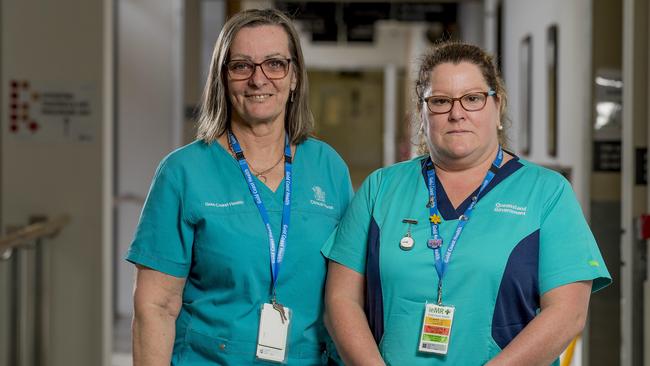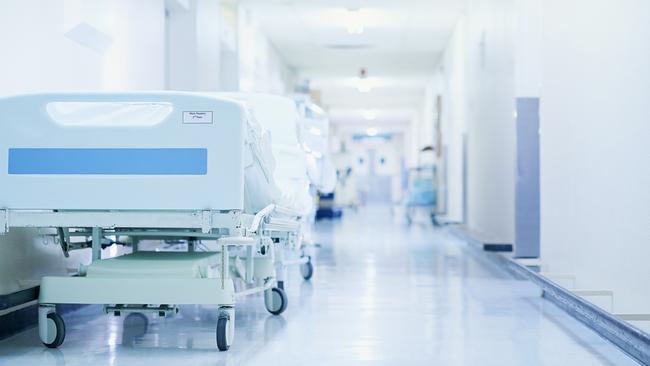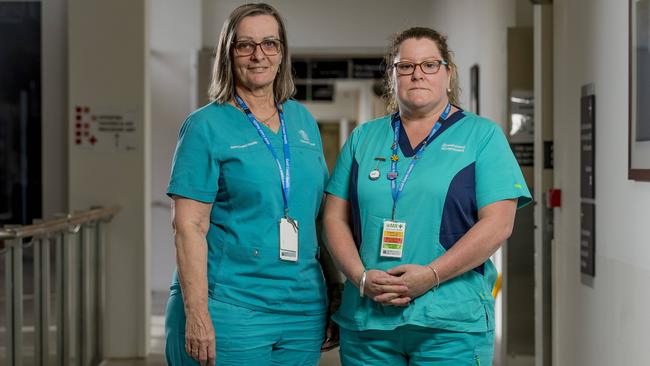Ann Wason Moore: Gold Coast nurses Joy Neal, Janine Oxley, Eileen Kearns on health struggles in pandemic
Bathing bodies battered by illness, holding a hand as the last breaths are drawn - it’s all part of a nurse’s work. But for these Gold Coast nurses it’s taken a more confronting turn.
Gold Coast
Don't miss out on the headlines from Gold Coast. Followed categories will be added to My News.
BATHING bodies battered by illness, easing a patient’s pain whether physical or emotional, simply sitting beside a hospital bed in the small hours of the morning and holding a hand as the last breaths are drawn … it’s all part of the profession of nursing.
While caring for cancer patients is confronting for even the most experienced nurse, it is painful not just professionally but personally when you have the same disease.
Yet for Robina Hospital acute medical ward nurses Joy Neal, Janine Oxley and Eileen Kearns, working has become the best medicine for dealing with their own cancer diagnoses.
Still, it’s a bitter pill to swallow when the patient could be you.
“You can’t help but think this could be you one day,” says Janine, who was diagnosed with breast cancer in February but now is in remission.
“You try not to let your mind go there but in this ward, we have a lot of end-of-life care.”
And yet for her workmate Joy, who is living with a rare and terminal lung cancer, seeing that glimpse into the future is helpful.
“It’s confronting for sure, but knowledge is power. The more I know about what is to come, the more I can prepare myself. I’m not afraid to die.”
Even more admirably, Joy is not afraid to live either.
It is the very reason the energetic grandmother refuses to stop working on her ward until she needs to become a patient – and even then she will not leave her ward.
TESTING BOOM AT FEVER CLINICS AFTER THREE CASES LINKED TO MELBOURNE EMERGE
“When I die, I’ll be surrounded by my family. Not just my daughters and granddaughters, but my work family. I want the nurses I work alongside every day to be the ones there at the last, I want them holding my hand.”
Joy knows that her fellow ward nurses understand not just the call of this caring profession but, for Janine and Eileen especially, they understand the journey of cancer as well.
Eileen was also diagnosed with breast cancer and is undergoing chemotherapy, but like her ward sisters she plans to return to work as soon as possible.
While their diagnoses and prognoses might be different, all three women insist that work is vital to their own recovery.

Janine says not only does working keep her mind off her illness, it makes her feel better to do what she does best – care for patients.
However, she admits that sometimes it can be a struggle.
“I’ve nursed more than a few women with breast cancer and not all of them recovered,” she says.
“That’s hard. On the one hand it makes me feel guilty that I’m in remission, but on the other hand it makes me worry about my cancer coming back.
“When I’m in the moment and I’m looking after my patient, that’s all that I’m thinking about. But it’s later on that it haunts you. You can’t help projecting your own future and wondering whether that will be you some day.
“Even though I’m in remission I can’t imagine the day when cancer won’t be in the front of my mind. I feel like it’s something that’s always going to be shadowing me.
“That’s why work is so good for me. It keeps my mind off focusing on that but also, who better to discuss your health with than other nurses? And especially Joy and Eileen who know exactly what I’m talking about.
“My husband and sons of course care and worry about me, but it’s really hard for them to talk matter of factly about what may or may not happen. They would rather that it never happened at all and I would too. But I have to face reality and that’s when my work family really step up for me.”

While Joy was first diagnosed with a type of non-small cell lung cancer in January 2017, an extreme course of radiation and chemotherapy brought her into remission. But in January this year, scans revealed the cancer had returned. This time the prognosis was terminal.
While she is receiving targeted treatment to slow the cancer’s growth, its efficacy is limited, meaning that ultimately she will require palliative care to ensure her last days are as painless as possible.
FEVER CLINIC DOCTOR REFUSED ENTRY TO QUEENSLAND TO WORK
Just weeks after Janine’s cancer officially returned, both Janine and Eileen received their own diagnoses.
Janine says she was extremely fortunate to have caught her breast cancer so early, just randomly stopping at a mobile mammogram truck parked near her Mount Tamborine home one day.
“Eileen and I both found out we had cancer just weeks apart, and that was just weeks after Joy got her news. It was pretty shocking, but also we are so blessed to have each other during this time.
“Eileen and I live very close to each other too, so I’m able to help her out, especially right now as she’s going through chemo.
“Being able to be strong for each other, or to have someone to cry to, is worth so much. It’s like when you become a parent. You can read all about it but until you’ve gone through it, you don’t understand.”
Joy says as well as her tough prognosis, she has also had to face the stigma of having lung cancer. While her specific cancer is not related to smoking, she says she feels like she has to justify herself when people ask what kind of cancer she has.
JUST ONE NEW CASE OF CORONAVIRUS RECORDED IN NSW
“With my cancer, 90 per cent of the people who get it are men. The 10 per cent who are women are usually Asian women under the age of 40. I won the wrong lottery.
“But I don’t get mad about it, I just accept it. I think that’s actually one of the most important things to do when you get a prognosis like this … hope is great, but acceptance lets you live your life.
“I can accept that I’m going to die earlier than I planned. I can accept that I won’t see my grandchildren grow up.
“Nobody is promised a long and happy life. You have to make the best of what you have. And that’s what I’m trying to do.
“I’ve never cried about it. I’m not blocking anything, I just don’t see what crying over it will do. It’s not going to make me live longer.”

Janine says Joy’s matter-of-fact acceptance of her fate is an inspiration.
She says it eases her own anxieties about her health and sets an example of how to handle adversity.
“Joy has handled this all with such grace and strength. More often than not she’s consoling us, not the other way around.
“When I got my diagnosis, I knew that I wanted to follow in her footsteps and keep working on the ward as long as my health and treatment permitted that. Looking after other people is looking after myself as well.
“But I did have to ask Joy one day, why are you still here at work? Why aren’t you lying on a beach, drinking cocktails? But she said that’s never been what her life is about, so why would she change that now?”
Joy says she refuses to compile a bucket list as she would far rather focus on her life than her death.
She says the only time she felt truly angry about her circumstances was due to the coronavirus pandemic rather than cancer.
“I had a trip planned to go back to England to see friends and family and obviously that was all cancelled thanks to COVID,” says Joy.
“It’s funny, I’ve never been mad about cancer. Yes, I’d rather not to have it, but we’re all going to die eventually. But COVID coming along and ruining what was probably my last chance to see family, that didn’t have to happen.
“That was probably the closest thing I had to a bucket list. People always ask me what I want to do before I die and all I really want to do is just keep living my life.
“I am a nurse, I’ve been a nurse for 25 years … it’s what I was born to do. This is where I belong and it’s a privilege to use as many of the days that I have left to look after other people.
“Having terminal cancer has made me a better nurse that I ever was before. I know exactly what it’s like to be a patient. I know how they feel lying in that bed. And I know that we give them the best possible care they could have.
“That’s why, when it is my time, I know that no matter what I will die at home. Maybe it will be my own home with my daughters and granddaughters, or maybe it will be here on my ward, with my family and work family around me.
“The people of this ward have held me up during these years and I know they will look after me when I’m leaving this life. I’ve had a good life and I know I’m going to have a good death.”
Originally published as Ann Wason Moore: Gold Coast nurses Joy Neal, Janine Oxley, Eileen Kearns on health struggles in pandemic

